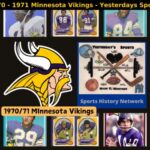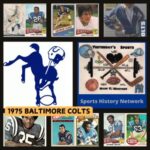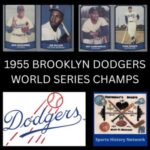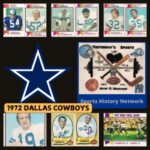After posting an impressive 69–24–2 record over the last six seasons, including two NFC titles and one Super Bowl victory, the Dallas Cowboys entered the 1972 season with high hopes of winning another championship.
LISTEN ON YOUR APP OF CHOICE
Duane Thomas Distraction To Start Season
But things didn’t start well. Discontented running back Duane Thomas refused to report to training camp unless he received a new contract. Thomas was a key player on the 1971 team and a major reason they won the Super Bowl. However, the Cowboys’ front office decided he wasn’t worth the trouble he was causing, and on July 31, they traded him to the Chargers for running back Mike Montgomery and receiver Billy Parks.
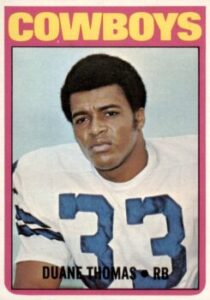
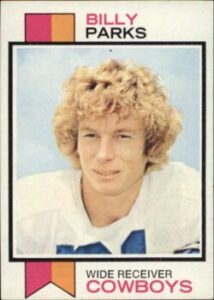
Staubach's Injury and a Changing of the Guard
Then, in the third preseason game, starting quarterback Roger Staubach injured his shoulder and needed surgery. This caused him to miss nearly the entire season. Craig Morton would be the starting quarterback.
Additionally, the Cowboys didn’t have one of their better draft picks. The only two notable players were fullback Robert Newhouse, taken in the second round, and tight end Jean Fuggett, taken in the thirteenth round. However, both players saw limited action during the season.
Age was also becoming a concern, as the Cowboys had thirteen players who were thirty years old or older. Linebacker Chuck Howley was 36. Tight end Mike Ditka, cornerback Herb Adderly, linebacker Dave Edwards, and defensive tackle Bob Lilly were all 33. Receiver Lance Alworth was 32, as were defensive end George Andrie and safety Cornell Green.
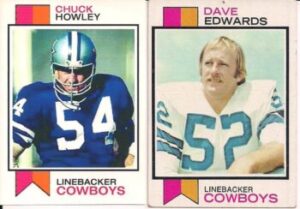
The Cowboys kicked off their preseason with a 20–7 victory over the College All-Stars. They then lost three of their next five games, finishing the preseason with a 3–3 record.
1972 Season Kicks Off
The season opener was on September 17 at Texas Stadium against the Eagles. With the Cowboys trailing 6–0 in the second quarter, Morton connected with Ron Sellers for a 37-yard touchdown. Dallas added three more touchdowns in the second half and cruised to a 28–6 victory.
The Doomsday Defense had a tough time containing receiver Harold Jackson, who caught 9 passes for 161 yards, but they did hold the Eagles’ running game to only 70 yards.
In a week two game against the Giants at Yankee Stadium, Cowboys running back Calvin Hill gained 91 yards on 20 carries. The Dallas defense limited the Giants’ running game to just 84 yards, but struggled again in pass defense. Giants quarterback Norm Snead connected with receiver Rich Houston on 55- and 94-yard touchdown passes. The final score was Dallas 23, New York 14.
In a game dominated by defense, the Cowboys held the Packers to 168 total yards but still lost 16–13 due to five turnovers, while the Packers had none.
In a game against the Steelers a week later, the Cowboys trailed 13–10 in the third quarter when Morton connected with Ron Sellers for a 55-yard touchdown. Dallas had success running the ball against the ‘Steel Curtain’ defense.
Calvin Hill ran for 108 yards on 23 carries, and Walt Garrison gained 76 yards on 12 carries. Terry Bradshaw struggled against the Doomsday defense, completing only 12 of 39 passes for 166 yards, with no touchdowns and one interception, while getting sacked three times. The final score was Dallas 17, Pittsburgh 13.
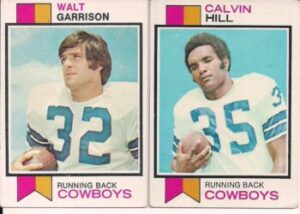
The following week, the Cowboys overwhelmed the Colts 21–0. The Cowboys’ offense amassed 390 yards while the defense limited them to just 175. Craig Morton played well, completing 22 of 30 passes for 279 yards. His primary target, Ron Sellers, caught seven passes for 113 yards, including a 44-yard touchdown. The Doomsday Defense sacked Johnny Unitas four times and backup Marty Domres once.
Dallas jumped out to a 13–0 lead against Washington in a week six game at RFK Stadium, but from that point on, the Redskins controlled the game. Running back Larry Brown played a great game, gaining 95 yards rushing and 100 yards receiving. He scored two touchdowns: a 19-yard reception from Sonny Jurgensen and a 34-yard run. The Redskins won 24–20 and took sole possession of first place in the NFC Eastern Division.
The Cowboys started quickly in a Week 7 game against the Lions on Monday Night Football. First, Morton connected with Billy Parks for a 38-yard touchdown reception, and shortly afterward, he connected with Calvin Hill for a 33-yard touchdown. The Cowboys led 21–14 at halftime and held on for a 28–24 victory. Lions quarterback Greg Landry passed for 217 yards and two touchdowns, but the Doomsday Defense held the Lions’ running game to only 59 yards. Morton passed for 206 yards and three touchdowns.
Led 31-0 and Almost Lost?
The Cowboys traveled to San Diego to face the Chargers, and things got off to a great start for Dallas. Mike Montgomery returned a special teams fumble 54 yards for a touchdown. By the beginning of the fourth quarter, Dallas led 31–0. But the Cowboys’ pass defense broke down, and before they knew it, the score was 31–21. Dallas managed to hold on and win 34–28, but the defensive collapse was concerning. Three of the Chargers’ touchdowns came on passes of over forty yards.
In a game against St. Louis in week nine, the Cowboys again jumped out to a big lead. Leading 17–0 in the second quarter, Cardinals tight end Jackie Smith scored on a 68-yard touchdown reception. With the Cowboys leading 23–10 in the third quarter, Charlie Waters returned an interception 28 yards for a touchdown to make it 30–10. The final score was Dallas 33, St. Louis 24. The Cowboys’ defense allowed 282 yards passing but only 54 yards rushing. Calvin Hill, Walt Garrison, and Robert Newhouse combined for 230 yards on 48 carries. Ron Sellers caught seven passes for 111 yards, including a 41-yard touchdown reception.
The Cowboys improved their record to 8–2 with a 28–7 victory over the Eagles. The win featured two safeties. It was a big day for the Doomsday Defense, which limited the Eagles to just 126 yards and sacked Eagles quarterbacks nine times. On offense, Calvin Hill rushed for 100 yards on only 15 carries, and Roger Staubach got some playing time for the first time since shoulder surgery three months earlier.
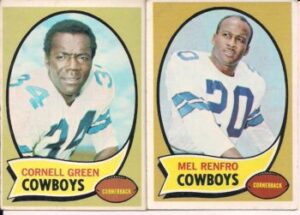
Race For the Playoffs
Four days later, on Thanksgiving, the Cowboys faced the 49ers. The 49ers were eager for revenge after losing to the Cowboys in the previous two NFC Championship games. Dallas took an early 7–0 lead, but from then on, it was all San Francisco. Dallas committed four turnovers, and Morton and Staubach were sacked nine times. The 31–10 defeat put them two games behind the first-place Redskins.
In a week twelve game in St. Louis, the Cardinals and Cowboys combined for ten turnovers. Dallas gained 349 yards and only allowed 141. Calvin Hill rushed for 120 yards, and the Cowboys easily won 27–6.
In a rematch with the Redskins in week thirteen, the Cowboys built a 28–3 lead by halftime. Washington scored three touchdowns in the second half to make the score look more respectable. Behind some great blocking, Walt Garrison rushed for 121 yards on just ten carries, including a 25-yard touchdown run. Calvin Hill carried the ball 24 times for 111 yards, scored two touchdowns, and added another 39 yards receiving. The final score was Dallas 34, Washington 24. The loss wasn’t a major blow to the Redskins, who had already secured the division title.
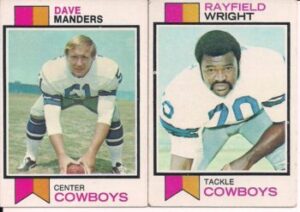
The Cowboys played an uninspired game against the Giants in the final game of the regular season, totaling only 132 yards of offense. The defense struggled to stop running back Vince Clements, who rushed for 105 yards on 23 carries. Although the Cowboys had already secured a playoff spot, the 23–3 loss didn’t sit well with Coach Tom Landry.
Calvin Hill became the first Dallas Cowboy to rush for over 1,000 yards in a season. Hill and Walt Garrison made the Pro Bowl, along with Mel Renfro, Cornell Green, and Bob Lilly. John Niland and Rayfield Wright made the Pro Bowl and All-Pro teams.
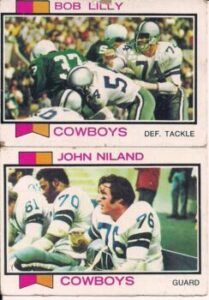
1972 NFC Playoffs
The Cowboys traveled to San Francisco for the NFC Divisional Playoff, and the start wasn’t good for them. Vic Washington returned the opening kickoff 97 yards to give the 49ers a quick 7–0 lead. Cowboys kicker Toni Fritsch booted a 37-yard field goal to close the gap to 7–3. The Cowboys’ defense was playing well, but they weren’t helped by their offense, which kept turning the ball over.
In the second quarter, the 49ers took a 21–3 lead. After another Toni Fritsch field goal, Lance Alworth scored on a 28-yard touchdown reception to narrow the gap to 21–13. But the 49ers responded with a touchdown of their own. Staubach, now fully recovered from his pre-season injury, replaced Morton, and Dallas added another field goal in the fourth quarter but still trailed 28–16 with only two minutes remaining.
Staubach, who had been sacked four times since entering the game, didn’t lose his composure and connected with Billy Parks for a 20-yard touchdown. With ninety seconds left, the Cowboys recovered an onside kick. Another strong pass rush forced Staubach to run. His 21-yard scramble was followed by an 11-yard completion to Parks. On the next play, Staubach connected with Ron Sellers for the go-ahead touchdown.
The Cowboys snatched victory from the jaws of defeat, 30–28. They outgained the 49ers 402 yards to 255. Calvin Hill had a big game, gaining 125 yards on 18 carries. Billy Parks caught seven passes for 136 yards and one touchdown.
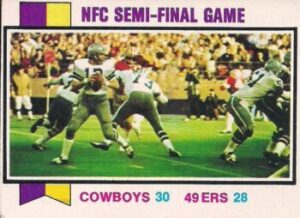
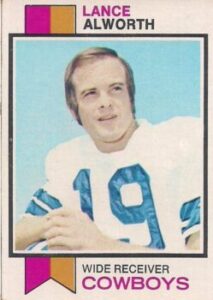
Now it was on to RFK Stadium to face the Redskins for the third time this season, but this time a trip to the Super Bowl was at stake. For three full quarters, the game was a defensive battle with the Redskins holding a 10–3 lead.
However, the Redskins dominated the fourth quarter and cruised to a 26–3 victory. Redskins quarterback Billy Kilmer had the best game of his career, completing 14 of 18 passes for 194 yards, two touchdowns, and no interceptions. His main target was Charley Taylor, who caught seven passes for 146 yards and scored two touchdowns.
It was a disappointing end to another successful season. The Cowboys returned to the NFC Championship game in 1973 but lost to the Vikings. Age finally caught up with the Cowboys in 1974, as they finished the season with an 8–6 record and missed the playoffs.
The Cowboys rebuilt in 1975 and made their third Super Bowl appearance in six years, but they lost a close game to the Steelers. They won the Super Bowl in 1977 and made a return in 1978, losing another close game to the Steelers.
Mark Morthier is the host of Yesterday’s Sports, a podcast dedicated to reliving memorable sports moments from his childhood days and beyond. He grew up in New Jersey just across from New York City, so many of his episodes revolve around the great sport’s teams of the 70s for the New York area.
He is also an author of No Nonsense, Old School Weight Training (Second Edition): A Guide for People with Limited Time and Running Wild: (Growing Up in the 1970s)

BOOKS BY MARK MORTHIER
Please Note – As an Amazon Associate I earn from qualifying purchases
More From Yesterday's Sports
1970s Minnesota Vikings : Would A Better QB Helped Them Win A Super Bowl?
Here’s a question I often hear, especially from Minnesota Vikings...
Read More1975 Baltimore Colts: A Year In Review
From 1957 to 1971, the Baltimore Colts never experienced a...
Read More“Dem Bums” No More: The Story of the 1955 Brooklyn Dodgers
From 1939 to 1954, the Brooklyn Dodgers had only one...
Read More1972 Dallas Cowboys: From Duane Thomas Drama to Staubach’s Stunning Comeback
After posting an impressive 69–24–2 record over the last six...
Read More